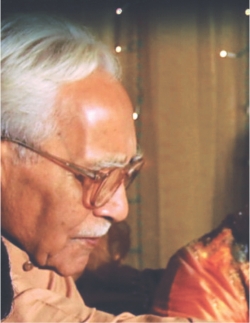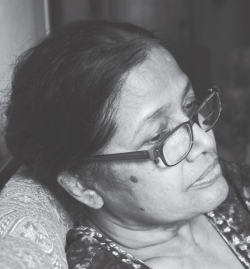| Home - Back Issues - The Team - Contact Us |
 |
| Volume 11 |Issue 19 | May 11, 2012 | |
|
|
Perspective
A Matter of Age In our culture, old age is associated with experience, wisdom and respect. An elderly family member has almost always been considered the head of a family and advice giver as well as someone to care for the way they cared for us when they were able. We all like to think that we'll get there at some point in the distant future but we rarely stop to ponder what it will be like when we do get there. Anika Hossain Let's start with how times have changed. In the past, it was taken for granted that parents would be looked after by one of their many children, preferably a son when they reached a certain age. People lived in joint families and therefore, sharing the responsibility of caring for an elderly person was simpler. Most women were housewives and had plenty of time to look after their in-laws or parents, whoever happened to live with them. Nowadays, especially in cities and among the upper middle class and upper class, family structures and social values are undergoing many changes. Although the tradition of taking care of the elderly is still widely practiced, it proves to be a challenge in nuclear families where fewer people are available to look after their needs. There are more women working and contributing to the family income leaving them less time to devote to the care of their elderly family members. While the healthcare system has improved over time, especially the private sector, the elderly must still rely on their family members to attend to them while they undergo medical care. “I live with my son, daughter-in-law and their two children,” says Mumina Kabir ( not her real name) who is now in her late 70s, “My son and his wife both work and the children go to school so I am left with the servants most of the day. They give me my medication and my meals and sometimes, they don't remember and I don't remember and I miss a dose or two of my daily medicines, but it can't be helped, who else will do it? I also miss having someone to talk to sometimes, everyone is so busy with their lives and I have nothing but free time.” “I live with my eldest daughter, her husband and son,” says Shawkat Haider (not his real name), “They are all very good to me and I have no complaints, but I don't like being dependent on them. I used to run my own business and after I retired and sold off my shares, I feel useless. I gave up my own house because my doctors advised me to live with family and now I feel as though I am constantly imposing on my daughter.” People like Haider and Kabir, who belong to the upper spheres of society, are financially stable and have no trouble paying their medical bills and running their households. “The problem is, it is difficult to leave my aged parents alone with the servants or even a professional nurse and trust them to provide the best possible care,” says Sumana Haque, “There is always some level of neglect on their part. I can't expect to them care about my parents the way I do. I have been hearing and reading stories in the news about how servants and drivers are attacking their employers for money and that scares me to death!” Hena Khan (not her real name) who is in her early 80s and lives on her own says, “My daughter-in-law and I never agreed on anything, so my son arranged for me to have my own place. I have a good staff that looks after me but my main problem is loneliness. I have always lived with a large family and am used to having constant company.”
For these senior citizens, there are very few alternatives. Old homes available in this country are inadequate in terms of staff and medical care. The existing homes are also geared for the less privileged elderly. Aging members of the middle and affluent classes are therefore almost entirely dependent on their children or other relatives. Hired caregivers are not always available or do not provide satisfactory services. This kind of situation demands a more holistic approach to aging. The Subarta Trust, established by Selina Aktar has come up with the concept of the Swapnalok Peace Valley project. Subarta Trust is also the founder of the Arunima Old Age Home which was established in 2000 for the underprivileged aging population. “The Swapnalok project is different from other old homes,” says Selina Aktar, who is the Secretary General of the Trust. “This project is for the upper class of the society, designed so they can lead a life of independence and dignity, with the best possible care and attention.” The Peace Valley, says Selina, which will be located in Singair, near the Manikganj area, will consist of cottages, each about 1000 sqft in size. These cottages are saleable, and elderly members of our society can purchase a plot for a mere 5lakhs. Once the sale is made, it will take about 6 months to build the cottage, the cost of which will amount to 12 lakh Takas. “Those who are financially stable can easily afford to buy a cottage and secure a comfortable home for their old age,” says Aktar. “Each cottage will have a beautiful garden and a farming area. The complex in which the cottages will be built will also have a hospital, ambulance service, trained nurses and caregivers for the residents, a gym and a physiotherapy centre, a catering service, opportunities to run small businesses and proper security. The elderly residents will be a part of a community where there will be an interactive atmosphere which will do away with their loneliness. The Subarta Trust will be responsible for managing and maintaining the peace valley.” Swapnalok will have provisions for three types of units. The economy class cottages will house eight people, the exclusive class will house four and the geriatric cottages for the invalid will house six people and will be owned by the Subarta Trust. The owner of each cottage can rent rooms to other elderly folks with whom they are acquainted. The rent will range from Tk 2500 to Tk 7000, depending on the type of facilities available, and each resident must pay Tk 2500 for medical expenses every month. Twenty percent of this rent will have to be paid to the trust, and this money will go towards building an old home for the underprivileged senior citizens. Each complex will have one such charitable house. In a country such as ours, where there is a lack of social security and government support for the aging population, this project will be of great assistance to many. The benefit of Swapnalok is that each cottage will be treated as a personal asset. These can be passed down as hereditary property if the owner chooses, and can be treated as family old age homes. The owner's family members, upon their demise may continue to rent the cottage out to other elderly people or use it as regular residence. They may also sell it back to the trust or to other eligible buyers. Owners may also choose to donate the cottage to other helpless senior citizens. Swapnalok is still in its planning stages, but it is a safe and appealing option for those members of our society who choose to and can afford to live out their old age as self dependent individuals. “I never really put much thought into where I want to be when I'm old,” says 40-year old Saima Chowdhury, “I know that I don't want to be a nuisance for my children. It would be good to be able to be self reliant.” There really is no way of knowing what becoming old is like, until we experience it for ourselves. Not everyone has an option to remain independent and lead a life of dignity when they reach old age, but those who can afford it should be given the opportunity to do so. Copyright
(R) thedailystar.net 2012 |

